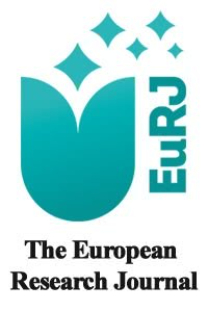Unnecessary computed tomography and magnetic resonance imaging rates in a tertiary care hospital
Ionizing radiation, medical education, radiological examinations, health policy, imaging utilization, repeat imaging CT, MRI, health care,
___
- [1] Gimbel RW, Fontelo P, Stephens MB, Olsen CH, Bunt C, Ledford CJ, et al. Radiation exposure and cost influence physician medical image decision making: a randomized controlled trial. Med Care 2013;51:628-32.
- [2] Tosun O, Algin O, Yalcin N, Cay N, Ocakoglu G, Karaoglanoglu M. Ischiofemoral impingement: evaluation with new MRI parameters and assessment of their reliability. Skeletal Radiology 2012;41:575-87.
- [3] Algin O, Ozmen E, Arslan H. Radiologic manifestations of colloid cysts: a pictorial essay. Can Assoc Radiol J 2013;64:56-60.
- [4] Algin O, Evrimler S, Ozmen E, Metin M, Ersoy O, Karaoglanoglu M. Desmoid tumor associated with familial adenomatous polyposis: evaluation with 64-detector CT enterography. Iran J Radiol 2012;9:32-6.
- [5] Kartal MG, Algin O. Evaluation of hydrocephalus and other cerebrospinal fluid disorders with MRI: an update. Insight imaging 2014;5:531-41.
- [6] Algin O, Evrimler S, Ozmen E, Metin MR, Ersoy O, Karaoglanoglu M. A novel biphasic oral contrast solution for enterographic studies. J Comput Assist Tomogr 2013;37:65-74.
- [7] Saadat S, Ghodsi SM, Firouznia K, Etminan M, Goudarzi K, Naieni KH. Overuse or underuse of MRI scanners in private radiology centers in Tehran. Int J Technol Assess Health Care 2008;24:277-81.
- [8] The Ministry of Health of Turkey, Health statistics yearbook. 2013 http://sbu.saglik.gov.tr/Ekutuphane/kitaplar/health_statistics_yearbook_2013.pdf
- [9] Crownover BK, Bepko JL. Appropriate and safe use of diagnostic imaging. Am Fam Physician 2013;87:494-501.
- [10] The Ministry of Health of Turkey, Health statistics yearbook. 2013 http://ekutuphane.sagem.gov.tr/kitaplar/health_statistics_yearbook_2014.pdf
- [11] Atac GK, Parmaksiz A, Inal T, Bulur E, Bulgurlu F, Oncu T, et al. Patient doses from CT examinations in Turkey. Diagn Interv Radiol 2015;21:428-34.
- [12] Technical Report, Radiation sources in Turkey (Turkiye’de Radyasyon Kaynaklari) 2012 Available at: http://www.taek.gov.tr/belgeler-formlar/func-startdown/886/.
- [13] Chen RC, Chu D, Lin HC, Chen T, Hung ST, Kuo NW. Association of hospital characteristics and diagnosis with the repeat use of CT and MRI: a nationwide population-based study in an Asian country. AJR Am J Roentgenol 2012;198:858-65.
- [14] Ip IK, Mortele KJ, Prevedello LM, Khorasani R. Repeat abdominal imaging examinations in a tertiary care hospital. Am J Med 2012;125:155-61.
- [15] Berrington de Gonzalez A, Mahesh M, Kim KP, Bhargavan M, Lewis R, Mettler F, et al. Projected cancer risks from computed tomographic scans performed in the United States in 2007. Arch Intern Med 2009;169:2071-7.
- [16] Sulagaesuan C, Saksobhavivat N, Asavaphatiboon S, Kaewlai R. Reducing emergency CT radiation doses with simple techniques: a quality initiative project. J Med Imaging Radiat Oncol 2016;60:23-34.
- [17] IAEA. Radiation protection of patients (RPOP). Referring medical practitioners. https://rpop.iaea.org/RPOP/RPoP/Content/InformationFor/HealthProfessionals/6_OtherClinicalSpecialities/referring-medical-practitioners/index.htm
- [18] Arslanoglu A, Bilgin S, Kubal Z, Ceyhan MN, Ilhan MN, Maral I. Doctors' and intern doctors' knowledge about patients' ionizing radiation exposure doses during common radiological examinations. Diagn Interv Radiol 2007;13:53-5.
- [19] Bailey ED, Anderson V. Syllabus on radiography radiation protection. 6th revision, Sacramento, CA. https://www.cdph.ca.gov/pubsforms/Guidelines/Documents/RHB-RadiographySyllabus.pdf
- [20] RSNA Syllabus for Biological Effects and Radiation Safety Associated with Imaging Modalities Updated 2011-12. https://rsna.org/RadioBiology_Syllabus.aspx
- [21] Geenen RW, Kingma HJ, van der Molen AJ. Contrast-induced nephropathy: pharmacology, pathophysiology and prevention. Insights Imaging 2013;4:811-20.
- [22] Prince MR, Zhang H, Morris M, MacGregor JL, Grossman ME, Silberzweig J, et al. Incidence of nephrogenic systemic fibrosis at two large medical centers. Radiology 2008;248:807-16.
- [23] Algin O. A new contrast media for functional MR urography: Gd-MAG3. Med Hypotheses 2011;77:74-6.
- ISSN: 2149-3189
- Yayın Aralığı: Yılda 6 Sayı
- Başlangıç: 2015
- Yayıncı: Prusa Medikal Yayıncılık Limited Şirketi
Complete intraventricular migration of the ventriculoperitoneal shunt
Yusuf TUZUN, Ufuk OZSOY, Elif Basaran GUNDOGDU
MELİHA KASAPOĞLU AKSOY, LALE ALTAN İNCEOĞLU, Sezin SOLUM
Engin AKGÜL, Nurhayat BİRCAN, Gündüz YÜMÜN, Ahmet Hakan VURAL
Hasan ARI, Selvi Oztas COSAR, Selma ARI, Kübra DOĞANAY, Cihan AYDİN, Nadir EMLEK, Nuran CELİLOGLU, Ahmet Seçkin ÇETİNKAYA, TAHSİN BOZAT, Mehmet MELEK
Elif Basaran GUNDOGDU, Ufuk OZSOY, Yusuf TÜZÜN
Deniz Demir, Mehmet Tugrul Goncu, Nail Kahraman, Temmuz Taner, Buket Ozyaprak, Arif Gucu
Prevalence of corneal astigmatism and axial length in cataract surgery candidates in Turkey
Sadik Gorkem CEVİK, Mediha Tok CEVİK, Rahmi DUMAN, Resat DUMAN
Post-catheterization giant pseudoaneurysm of the femoral artery: an delayed clinical presentation
Deniz DEMİR, MEHMET TUĞRUL GÖNCÜ, Nail KAHRAMAN, Temmuz TANER, Buket ÖZYAPRAK, Arif GÜCÜ
Laparoscopic cholecystectomy in childhood: a review of twenty-four consecutive cases
Mete KAYA, Esra OZCAKİR, Serpil SANCAR
How frequent is nocturia in medical students?
Burhan COSKUN, Nizameddin KOCA, Ismet YAVASCAOGLU, Onur KAYGİSİZ, Turgut YURDAKUL
